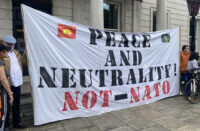Two rival positions are circulating regarding the British and the North. The first is the British have no interest in maintaining the North. Lord Alderdice recently revived this argument in an interview online, claiming the Irish government, not the British, block unity. The second is that the British want to retain the North.
Who is right? The British can’t both want and not want the North.
One reasonable way to solve the question is to examine interests. Indeed, as Eugene McCartan once advised, “imperialism has no friends, only interests.” What are those interests? Assuming British capitalism drives state policy – a reasonable assumption for Marxists – what economic class interests require jurisdictional lock-in? Do economic interests retain advantages in the North they do not get in the South? Would the same advantages accrue in a united Ireland holding current political conditions constant? Given British capitalism was content to cut the North off from its internal market, what might this tell us?
Even if one answered the above questions without finding any apparent capitalist class interests, this would not negate the notion of “British interests” in the North. One could assume the British state has security interests in the North, and we might see the state as concerned with the capitalist class’s long-term, broader and strategic interests.
Yet do not the ruling political classes, both sides of the Irish Sea, sing from the same NATO sheet? Is Ireland at risk of becoming “Britain’s Cuba”? What is the military value of the North concerning “threats” from the East? Putin is hardly the Warsaw Pact, and China is geographically remote. Might the security apparatus be unable to move openly in the North for the same reasons they cannot have a hard border: rightful mass opposition? If the British cannot even place customs checks on our internal borders, might their freedom of action for military matters be much reduced, in turn weakening the North’s value?
Britain has security interests in terms of what its neighbour does, much the same way Russia has with the Baltic states (and vice versa), but this doesn’t by necessity require zero-sum dynamics, jurisdictional ties or internal meddling (although old habits die hard).
Yet, as reported in last month’s Voice, a right-wing think tank in the UK recently advocated increased military presence in the North. We should take that document with a grain of salt. The report is authored by two young international PhD students from LSE and Cambridge who lack a serious security background (and it shows). The report is prefaced by well-known military hawks who retired two decades ago and a retired Tory MP who resigned in disgrace. Moreover, while Cambridge and LSE PhD students are bright, I suspect someone else is crafting Cabinet or MI5 policy.
Of course, none of the above may matter. After all, Britain calls the shots on unity. Or do they? The problem with this argument is overemphasising de jure in isolation from de facto. It ignores that the British cannot politically call a referendum unilaterally. Indeed, there would be no point until the Irish government calls one concurrently in the South, as is required[1]. It also ignores the thrust of inter-governmental relations in the current conjuncture under Strand III.
One final point on Alderdice: he may be right. If we want to find research papers that influence elites, I encourage comrades to read Fitzgerald and Morgenroth (2019) paper in the Journal of the Statistical and Social Inquiry Society of Ireland. Fitzgerald represents the cream of the Irish bourgeois academic intelligentsia and has long been an influential voice in economic policy: his paper of 2019 and some of the seminars he did around it evidenced that unification is too costly for the Southern state. Unlike our PhD students in the LSE and Cambridge, I expect Fitzgerald has the ear of those who make policy on these matters – and they’ve listened.
[1] “Who Can Call a Referendum on A United Ireland?”, article on IICCRR website: (https://iicrr.ie/who-can-call-a-referendum/)






